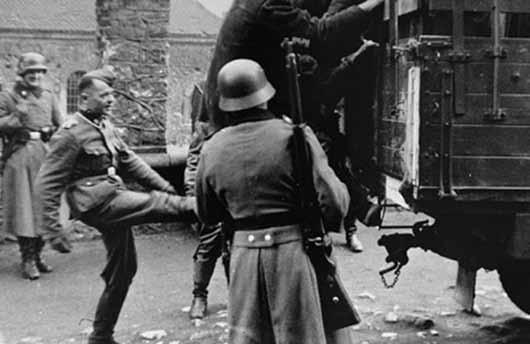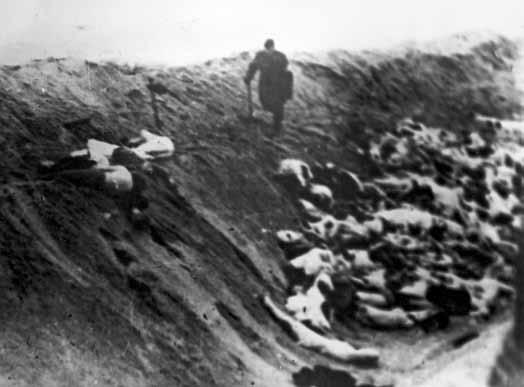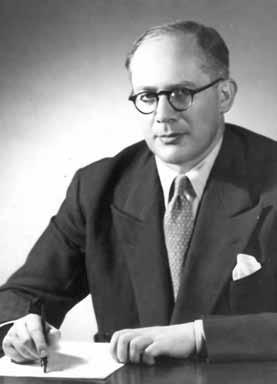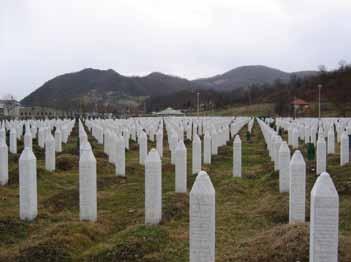
11 minute read
On Holocaust and Genocide
Yehuda Bauer
n December 1948 the United Nations adopted the Convention on the Prevention and Punishment of the Crime of Genocide Since then, a number of genocides have taken place During the last century, many millions of civilians and unarmed prisoners of war were murdered by governments and /or political parties or their agents . Many people will agree that this is one of the major challenges humanity faces today, though the views about what exactly constitutes genocide are varied and contradictory Most of us, however, will agree that genocide is the annihilation of groups as such When the term ‘genocide’ was coined by a refugee Polish - Jewish lawyer named Raphael Lemkin in New York , probably in 1943, it was based on the realisation that Jews and Poles were then being murdered by National Socialist Germany The annihilation of the Poles was partial, as the Germans wanted to use them as slave labor The murder of the Jews, however, was total – every person defined by the Nazis as being Jewish and whom they could find – and that is reflected in the Convention which talks about the intent to annihilate an ethnic, national, racial or religious group, partially or totally. Many would add political groups to this list
Advertisement
But , people will ask , if you want to deal now with genocide, why start with the Holocaust , and not with Rwanda, Cambodia, Darfur and so on? Was the genocide of the Jews which we call the Holocaust in some ways different from the other tragedies? Was it not parallel? In my view, it was both I used to call the Holocaust ‘unique’, but a number of years ago I abandoned the term ‘uniqueness ’ to describe the genocide of the Jews and have instead been using, in fact I coined, a very cumbersome word: ‘unprecedentedness ’. Why is ‘uniqueness ’ inappropriate? Mainly for two reasons . One, that ‘uniqueness ’ might imply that the Holocaust is a onetime event that cannot be repeated; but in that case there is hardly any point dealing with it , as there is no danger of its recurrence However that implication is untrue: the genocide of the Jews was engineered and executed by humans for human reasons, and anything done by humans can be repeated – not in exactly the same way, to be sure, but in very similar ways Two, it might also imply that it was decreed by some God, or god, or Satan, that is, a transcendental force, in which case Hitler and the perpetrators generally would have been the executors of a divine or satanic will and could not be held responsible, as they were not free actors That indeed is the position of some Jewish ultra - orthodox thinkers, and some Christian thinkers too. Yet these thinkers do not accept the idea of lack of responsibility of the perpetrators and argue, rather illogically, I would think , that there is free will and humans can choose between good and evil, although on the other hand they say that nothing can
Ihappen without the Almighty ’s will. The argument , then, that the Holocaust was ‘unique’ because it was caused by some transcendental Power leads to absurdity
I would argue that , obviously, the Holocaust was a genocide, and that therefore it not only can, but must , be compared with other genocidal events of a similar nature or quality The main parallel between it and other genocides lies in the suffering of the victims, which is always the same, as there are no gradations of suffering, and there are no better murders or better tortures or better rapes than others The suffering of the victims is always the same and, from that point of view, there is no difference between Jews , Poles, Roma (‘Gypsies ’), Russians, Darfurians, Tutsi, or anyone else
The other main parallel, I would suggest , is that perpetrators of genocides or mass atrocities will always use the best means at their disposal to realise their project In the genocide of the Armenians in World War I – which is still being denied by official Turkey - the Ottoman Turks used railways , machine - guns, specially recruited murder units and a fairly efficient bureaucracy which had been developed with the help of French, German and Austrian advisers, and a mass army The Germans, in World War II, used railways, special units, modern weaponry, an excellent bureaucracy, brilliant propaganda, and a very powerful army They used gas, because they had it ; the Ottomans did not , because they did not have it
I would argue further that I do not know of any element in genocides other than the Holocaust that are not repeated in other genocides; but that there are elements in the genocide of the Jews that are without a precedent in human history, as far as I know It is clear, though, that the Holocaust was a precedent and that these elements can be repeated, and in one case they already have been repeated What are these elements?
One, the totality : there is no precedent , it would seem, to a state - organised mass murder of members of a targeted group, in which every single person identified as a member of that group by the perpetrator – not self- defined – was sought out , registered, marked, dispossessed, humiliated, terrorised, concentrated, transported and killed Every single person defined as a Jew who was caught, without a single exception So - called half- Jews were left alive when they were considered not Jewish. The moment people were thought of as being Jewish, they were subjected to the above process .


Two, the universality : there is no precedent , it would seem, to a universally conceived genocide Thus, the Ottomans did not bother about the Armenians in Jerusalem, because that was not Turkish ethnic territory Hutu power wanted to ‘cleanse’ Rwanda of Tutsis, but there were apparently no plans to kill all Tutsis everywhere
( After the genocide there were Hutu attempts to kill Tutsi - related groups in Eastern Congo, but not , for instance, in Burundi or Uganda .) On the other hand, the National Socialist regime in Germany intended to deal with the Jews everywhere ‘ the way we deal with them here in Germany ’, as Hitler told the Mufti of Jerusalem, Hajj Amin el - Husseini, on 28 November 1941, to quote just one clear statement – there were more This genocidal universalism developed in stages, of course, and had no known precedent
Three, the ideology was based not on any pragmatic, economic, political, military, or other consideration, but on what Marxists would call pure superstructure
The Armenian genocide was the answer to political defeat in the Balkans, and was the result of the dream of a new Turkic empire stretching from the Dardanelles to Kazakhstan replacing the old, collapsing one; and there was the fear of a Russian invasion supported by Armenians that would destroy the Turkish state altogether There was also the intent to replace Armenian merchants in the main cities with Turks These are political, military and economic considerations Take any other genocide and you will find such pragmatic bases, on which of course ideologies were then built as rationalisations There were no such pragmatic elements with the Nazis German Jews did not control Germany’s economy, with due respect to various Marxist writers
Only one major industrial establishment , the AEG, the major German electrical company, was owned by a
Jewish family and there was one Jew among some one hundred members of the boards of the five major German banks . Jews were mostly middle class, lower middle class, members of free professions , and craftsmen; the rich ones owned a few major consumer stores But Jews were not an organised group in any meaningful sense; their countrywide organisation, the Reichsvertretung der Deutschen Juden (Reich’s Deputation of German Jews), was founded in September 1933, nine months after the Nazi accession to power, as a result of Nazi pressure, not before There had in fact never been an organised German Jewry before the Nazis They had no territory and had no political, never mind military, power or presence No Jewish individual held a ministerial post in Germany before World War I . After the war, only Walther Rathenau, the owner of AEG, held a ministerial position before he was murdered by right- wing extremists in 1922 . The reasons for the persecution of Jews bore no relation to reality, but were of the nature of nightmares: the imagined international Jewish conspiracy to control the world (a mirror- image of the Nazi desire to do so), the supposed corruption of German blood and society and culture by the Jews (when in fact the Jews, who were loyal German citizens , contributed, as individuals, very considerably to German culture), the blood libel (the accusation that Jews killed non - Jewish children to bake their matzot), and so on I know of no other case in past history where mass murder was committed for no apparent pragmatic reason at all. Some historians seem to believe that the Jews were murdered in order to obtain their property. But that is demonstrably wrong: in many cases they were murdered after they had been deprived of their property, and the fit among them could have been used for slave labor The looting was done in the process that led to the murder, not the other way round
The non - pragmatic nature of the genocide can be shown in, literally, hundreds of cases Thus, Lodz, the second largest city in prewar Poland, had the last ghetto on former Polish territory, because its workshops , run basically as slave labor places, produced some 9% of the Wehrmacht ’s requirements for clothing and boots . In early 1944, the local Nazi bureaucrats were opposed to the liquidation of the ghetto, partly because its usefulness for the German Army, and also because they themselves had enriched themselves at the expense of the Jews In addition, if the ghetto was liquidated they might have to serve in the army – not a very inviting prospect But the ghetto was liquidated on Himmler ’s orders, explicitly arguing against any economic pragmatism Ideology held sway and no economic arguments were admitted Is that capitalistic? Cost- effective? Rational? There is no known precedent for a genocide committed because of nightmarish fantasies . Fourth, the racialist Nazi ideology was something utterly revolutionary. Communism, before it became the rationalisation for Russian imperialism, wanted to replace one social class by another – something we have known from past history Nations have replaced nations, empires have replaced empires, and religions have superseded other religions But ‘races ’? Never before And, of course, there are no ‘races ’. We all are descendants of a group of Homo sapiens that roamed East Africa some half a million years ago, give or take a couple of hundred thousands of years . Hitler, Einstein, you and I, come from the same place. The National Socialist revolution was, I would argue, the only really revolutionary attempt in the twentieth century, bar none, and it was of course without any precedent A new hierarchy was to rule the world – a hierarchy of the Nordic peoples of the Aryan race, and presumably their Japanese allies (who are not exactly Nordic Aryans, which created some ideological problems), with everyone else underneath that , and no Jews, because they would all have been killed by then In a distorted way, this was a quasi - religious view : there was a God, a Messiah, namely the Fuehrer, and a holy people or race, and there was a Satan The satanic Jew was taken from a de - christianised Christian antisemitism. And, naturally, Satan had to be fought, defeated and killed. Any precedents for that in human history? I would suggest – no.
Fifth and finally, the Jews: their culture provides one of the background elements to the emergence of what is wrongly termed ‘ Western Civilisation’. The Nazis rebelled against that , against the Enlightenment , as well as against Christianity (which is Jewish, they argued; they were right on that one). The legacy of the French Revolution rests on Athens , Rome and Jerusalem (aesthetics, literature, law and order, and the ethics of the prophets); Romans and Athenians today speak other languages, pray to other gods and write literature that has no direct connection to the sources But the Jews were still here, they spoke the same language and their traditions, though developed and changed over time, whether they were or are religious (a minority) or not (a majority), are direct , continuous cultural (not necessarily biological) descendants of the original ones . Their literature is indecipherable without relating it to their ancient texts A violent , brutal, exterminatory attack on the legacy of the French Revolution involved, almost necessarily and certainly logically, an attack on the only surviving remnant of the original sources from which Western Civilisation developed The ethics of the prophets stood in stark contradiction to the ideas behind the Nazi revolution – basically, an ideology that said that the stronger ‘races ’, or peoples, had not only the right but the duty to rule the world and do away with the weaker ones, even to annihilate them
The Holocaust , then, was unprecedented, a fact of tremendous importance to anyone who wants to fight the self- destructive tendencies in human society It also means that it was a precedent and, indeed, in Rwanda –my first point – totality of annihilation, was intended: all Rwandan Tutsis were to be killed I suspect that the most important Hutu power ideologue, Ferdinand Nahimana, now in jail, may have heard something about the Nazi annihilation of the Jews when he studied philosophy and history in Europe I cannot prove it , but it might be worth investigating
The Jewish specificity and the universal implications of the Holocaust are two sides of the same coin Every genocide is specific, so that specificity becomes a universal trait This universal characteristic has to be set into a context : we are the only predatory mammals that kill each other in large numbers, in mass atrocities some of which we label genocides, because they are the most extreme form of this , unfortunately, very human behaviour And the most extreme form of genocide, to date, was the genocide of the Jews, because of the points mentioned above, and perhaps a few others . It is that realisation of the unprecedented character of the Holocaust , vague as it is, that has made the Holocaust , in the eyes of an increasing number of humans and their institutions (such as the United Nations), the paradigmatic genocide, because it is the most extreme form of an illness that afflicts humanity
My conclusion would be that the Holocaust stands at the centre of any study or consideration of genocide, because of its paradigmatic nature; it is also the starting point of any serious attempt at preventing such mass atrocities When one starts from the extreme case –again, not because the suffering is any different , but because of other factors involved – one must become committed to an effort to stop or prevent ongoing and future genocides, because they are manifestations of the same human illness which caused the Holocaust . One has to add: mass murder committed by humans against humans is not inhuman – I wish it were – but , unfortunately, very human indeed The slogan ‘man’s inhumanity to man’ is fatally flawed Mass murder is an aspect of humanity that we have to fight , not something external to us One has to deal with Darfur, Zimbabwe, Eastern Congo, Southern Sudan, Burma and a number of other places in an increasingly crowded, small, world The only lesson one can draw from the Holocaust is that one has to fight genocide

Yehuda Bauer is Professor Emeritus of Holocaust Studies at the Hebrew University in Jerusalem and Academic Advisor to Yad Vashem, the Israeli and Jewish Memorial Institution to the Holocaust

We opened the doors of the upgraded Jewish Holocaust Centre’s museum in February 2010. A year later we invited two distinguished academics – Dr Adam Brown from Deakin University, Melbourne and Dr Gideon Greif, from the Shem Olam Institute in Israel and the Foundation for Holocaust Education Projects, Florida, USA, – to reflect on the changes and their impact.




